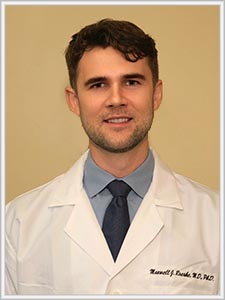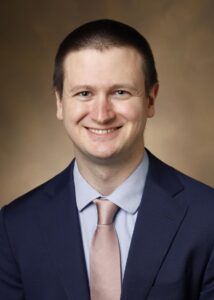Meet the New PSTP Associate College Advisors for Avery-Cohen
Maxwell Roeske, MD, PhD (’23)
by Stirling Argabright (G1)
 Maxwell Roeske, MD PhD, is a Vanderbilt MSTP alum, PGY-2 psychiatry resident on the research track, and a new PSTP advisor for Avery-Cohen college. He grew up in the town of Wauwatosa, Wisconsin, and earned his bachelor’s degree in biology and psychology from the University of Dayton in Ohio. He moved to Nashville in 2016 to join the Vanderbilt Medical Scientist Training Program, where he found his passion for psychiatry and earned his PhD in the Heckers lab studying the hippocampus and early psychosis.
Maxwell Roeske, MD PhD, is a Vanderbilt MSTP alum, PGY-2 psychiatry resident on the research track, and a new PSTP advisor for Avery-Cohen college. He grew up in the town of Wauwatosa, Wisconsin, and earned his bachelor’s degree in biology and psychology from the University of Dayton in Ohio. He moved to Nashville in 2016 to join the Vanderbilt Medical Scientist Training Program, where he found his passion for psychiatry and earned his PhD in the Heckers lab studying the hippocampus and early psychosis.
For Maxwell, getting to college was a major accomplishment in itself; neither of his parents received a college education, and once Maxwell got to Dayton he found himself in unfamiliar territory. He did know that he enjoyed science, and entered college as an “undecided sciences” major with an interest in a scientific approach to answering life’s big questions. He became a research assistant in an evolution and development lab, where he used molecular genetics techniques to study drosophila. It was during this time that those big questions began to take shape – How does the human brain work? What makes humans humans? By the end his college career, Maxwell’s interests had led him to a dual degree in biology and psychology and the decision to pursue a physician-scientist career, but by no means was his future figured out.
Maxwell came to Vanderbilt with the assumption that he’d become a neurologist – after all, that’s what doctors who liked the brain did, right? The trajectory of Maxwell’s career changed after interviewing his first psychotic patient on the wards of the psychiatric hospital, and he chose to join the lab of Dr. Stephan Heckers, psychosis expert, bringing a strong background in basic sciences to the clinical neuroimaging lab housed in the top floor of the hospital. Here, Maxwell’s passion for psychiatry blossomed as he began to study the brain from a new perspective. His graduate research was notable for proposing that incomplete hippocampal inversion, a developmental variant of the hippocampus, may be a neurodevelopmental mechanism in the pathogenesis of psychosis. His work also demonstrated that levetiracetam, an anticonvulsant, may decrease anterior hippocampal hyperactivity and improve hippocampal recruitment during memory-based tasks in patients with psychosis.
Upon reflection, Maxwell expresses deep gratitude for his journey through the Vanderbilt MSTP. When he began his training, he was near totally undifferentiated. Some of the classic advice given to a PhD student – to choose a lab to learn specific methods or focus on a field of interest – didn’t quite apply to him. Instead, he chose a PI whom he hoped to emulate – a clinical expert in his field who regularly saw patients, then recruited them for his research. To Maxwell, this was the prototype of a career he hoped to pursue. His advice to trainees is best delivered through the analogy of riding a wave: The life of a physician-scientist is full of ebbs and flows; when things are calm, use your time to recharge, and when things become busy, lean into your work and capitalize on that time. Your path will be long, and it’s important to build momentum you can use to your advantage to stay in the pipeline as your career progresses. This isn’t easily done alone, however. While you become increasingly specialized throughout your training – working to fill a niche unique to yourself – it’s important to think ahead and seek out mentors and institutions that are invested in you and what you hope to accomplish. In other words – surround yourself with support, lean into your time in training, and ride the wave.
Despite staying at Vanderbilt to continue his training in residency, much in Maxwell’s life has changed recently. Finally, his life is beginning to take the shape that he’s been working toward for years. He and his wife have both begun new positions, she as a clinical psychologist and he as a psychiatry resident. They are new homeowners, building a foundation for a life in Nashville. If that weren’t exciting enough, they recently welcomed their first child into their family and now, Maxwell says, “life is in technicolor.”
Matthew Villaume, MD, PhD
by Kristen Harris (M2)

Dr. Matthew Villaume, MD, PhD, is a Hematology-Oncology Clinical Fellow in Vanderbilt’s Physician Scientist Training Program, whose career reflects a journey defined by seizing every opportunity. His professional path began at Boston College, where his passion for chemistry led him to dive into organometallic research as an undergraduate. Motivated by this love for the field, he pursued a Ph.D. at The Scripps Research Institute, specializing in natural product synthesis in the lab of Dr. Phil Baran. While excelling in this research, Dr. Villaume recognized that his ultimate career goals required deeper human interaction, prompting him to pivot toward a career in medicine.
During medical school at Vanderbilt, Dr. Villaume demonstrated remarkable dedication, balancing the rigorous demands of medical training with his commitment to further advancing his laboratory skills. He quickly made an impact, publishing several studies on leukemic disease mechanisms while working in Dr. Michael Savona’s lab. Every free moment was spent refining his approach to research, leading to a shift toward translational applications. This pivotal shift taught him the immense value of honing technical skills. As Dr. Villaume explains, “Broad skills allow total freedom to reinvent yourself—techniques move you forward.”
Now a clinical fellow, Dr. Villaume advises students to seek mentorship at every stage of their careers, particularly when pursuing unconventional paths. Despite his deep commitment to being a physician-scientist, his greatest joy lies in spending time with his family. His favorite way to unwind is by visiting the Richland Park Farmers Market with his wife and kids.
Dr. Matthew Villaume’s career is a testament to the power of adaptability, determination, and a commitment to both scientific excellence and personal fulfillment. His journey from a passion for chemistry to becoming a physician-scientist in hematology-oncology highlights his ability to seize opportunities and pivot when necessary, always keeping both his professional and personal goals in sight. By balancing a demanding career with his devotion to family, and constantly striving to sharpen his technical and clinical skills, Dr. Villaume has carved out a path defined by growth, mentorship, and impact—both in the lab and beyond.